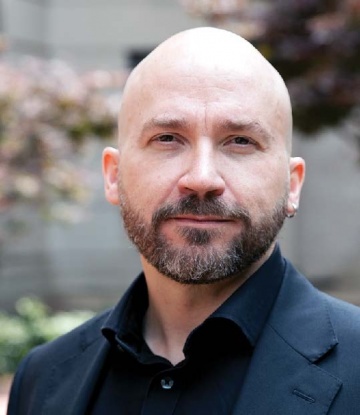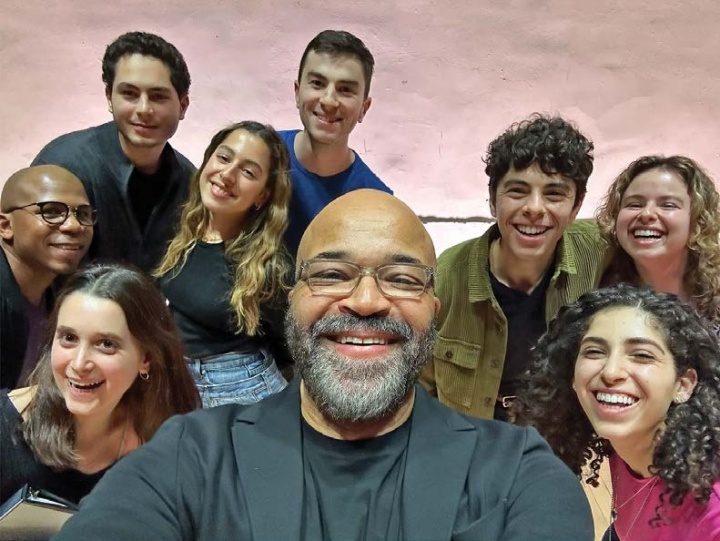Columbia College | Columbia University in the City of New York
Enemies, A Core Story
CCT_Summer_2024_vWEBFINAL1_Page_05_Image_0002.jpg

Core Curriculum director Larry Jackson
EMMA ASHER
I was thinking of these moments of pity, forgiveness and justice as I watched a group of Columbia students discussing tragedies — ancient and modern — in Miller Theatre in late February. The students were part of a tragic chorus that was reading excerpts from Book VI of The Iliad and scenes from Euripides’ tragedy The Trojan Women. The performance, directed by Brian Doerries, the founder and director of Theater of War Productions, focused on the fate of Hektor’s toddler son, Astyanax. We meet the young boy in one of The Iliad ’s few domestic scenes; in Euripides’ tragedy, we witness his murder at the hands of the Achaeans, who fear he will one day avenge his father’s death. “Pain begets pain, trauma upon trauma,” Hektor’s mother, Hecuba, laments in Doerries’ translation of The Trojan Women, summing up the awful logic of tragedy.
CCT_Summer_2024_vWEBFINAL1_Page_05_Image_0001.jpg

Academy Award nominee Jeffrey Wright took a selfie with the Columbia students who made up the tragic chorus at the Feb. 27 performance of Hector, Andromache, and the Death of Astyanax.
The Witten Center for the Core Curriculum organized this event for the Columbia community because we know what literature can do. It can enable us to recognize the humanity of our enemies. It can provide spaces for difficult discussions about contentious issues without seeking consensus or persuasion. And it can help us to name the unspeakable tragedies of our world, and endure the pain they cause.
We know that literature can do all of this because we see it happen every day in dozens of campus classrooms as more than 1,000 students discuss texts about war, racial injustice and exile in Literature Humanities. My colleague Clémence Boulouque and I reached out to Doerries to organize this performance knowing that the Core’s highest purpose is to foster community and to promote healing in times of crisis and conflict. We believed that the way forward for our divided community was to elevate and expand the work that we carry out each day in our classrooms, and that, in doing so, we might appeal to the best in others rather than shunning the worst in them.
The discussion that followed each performance delved into the most painful issues raised by the Oct. 7 Hamas massacres and the war in Gaza: sexual violence, abductions, the murder of civilians, famine, displacement and tragic cycles of conflict so old that no one can agree on how or when they began. Then the discussion would return to the texts: to the Greek authors who depicted the humanity of their vanquished enemies and the atrocities of their own soldiers; to the choices made by the characters; and to the meaning of their words.
The most inspiring moment for me was also the most ordinary. An Israeli student who had served in the IDF and was saying little in the discussion spoke at last, her voice quivering. Next to her sat a Palestinian student. He turned to the Israeli student next to him when she finished speaking, and responded using a familiar phrase: “I would just like to build on what you said.”
We hear this phrase perhaps a dozen times in every Core class as students construct their interpretations collaboratively, each contributing their own insight. The student’s phrase could not have been more prosaic, and yet, that day, knowing who the panelists were and why they were there, hearing them talk about their own painful experiences with prejudice, injustice and war, and sensing the courage that it took simply to be in that space together, I choked back tears.
After the final performance, Wright took a selfie with the student chorus, their smiles broad, radiating the camaraderie of old friends, though most of them had met only 48 hours earlier. Watching them pose, I thought again of Aeschylus: “In our sleep, pain, which cannot forget, falls drop by drop upon the heart until, in our own despair, against our will, comes wisdom through the awful grace of God.” Bobby Kennedy, who knew something about tragedy, recited these lines from memory on April 4, 1968, when he announced the assassination of Martin Luther King Jr. to a crowd in Indianapolis, and urged them to stop the tragic cycle of violence that had taken the life of a great man hours earlier.
In another context those students posing so happily on the stage of Miller Theatre might have been enemies. In a political climate dominated by social media and cable news, they might have been taught that they cannot be friends. But through literature, they found a way to interrupt these cycles of enmity. And they discovered a truth that we should all heed — that wisdom comes not from our own suffering, but by acknowledging the pain of others.
Issue Contents
Published three times a year by Columbia College for alumni, students, faculty, parents and friends.
Columbia Alumni Center
622 W. 113th St., MC 4530, 6th Fl.
New York, NY 10025
212-851-7852
cct@columbia.edu
Columbia Alumni Center
622 W. 113th St., MC 4530, 4th Fl.
New York, NY 10025
212-851-7488
ccalumni@columbia.edu

